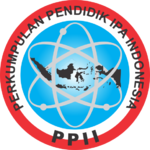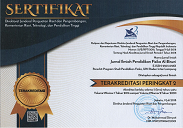Brain-Based Learning: The Impact on Student’s Higher Order Thinking Skills and Motivation
Abstract
Keywords
Full Text:
PDFReferences
Akyürek, E., & Afacan, Ö. (2013). Effects of brain-based learning approach on students’ motivation and attitudes levels in science class. Mevlana International Journal of Education, 3(1), 104–119. https://doi.org/10.13054/mije.13.08.3.1
Bunyamin. (2016). Teacher professionalism: A study on teacher’s professional and pedagogic competence at vocational high schools in the northern coastal of Jakarta. Indonesian Journal of Education Review (IJER), 147(1), 11–40.
Dare, E. A., Ellis, J. A., & Roehrig, G. H. (2018). Understanding science teachers’ implementations of integrated STEM curricular units through a phenomenological multiple case study. International Journal of STEM Education, 5(4), 2-19. https://doi.org/10.1186/s40594-018-0101-z
Fariyani, Q., Mubarok, F. K., Masfu’ah, S., & Syukur, F. (2020). Pedagogical content knowledge of pre-service physics teachers. Jurnal Ilmiah Pendidikan Fisika Al-Biruni, 9(1), 99–107. https://doi.org/10.24042/jipfalbiruni.v9i1.3409
Gözüyeşil, E., & Dikci, A. (2014). Beyin temelli öğrenmenin akademik başarıya etkisi: Bir meta-analiz çalışması, 14(2), 642–648. https://doi.org/10.12738/estp.2014.2.2103
Hake, R. R. (1998). Interactive-engagement versus traditional methods: A six-thousand-student survey of mechanics test data for introductory physics courses. American Journal of Physics, 66(1), 64–74. https://doi.org/10.1119/1.18809
Kaur, C., Singh, S., & Marappan, P. (2020). A review of research on the importance of higher order thinking skills (HOTS) in teaching english language. Journal of Critical Reviews, 7(8), 740–747. https://doi.org/10.31838/jcr.07.08.161
Khalid, A., Bawaneh, A., Zain, A. N., Saleh, S., & Abdullah, G. K. (2012). The Effect of a brain-based teaching method on conceptual change in students’ understanding of electricity change agent for arab development and education reform. Eurasian Journal of Physics and Chemistry Education, 4(2), 79–96.
Khalil, A. H., El-nagar, B. E. E., & Awad, M. A. E. (2019). The effect of brain-based learning on developing some speaking skills of egyptian EFL secondary school students. International Journal of Environmental & Science Education, 14(3), 103–116.
Kurniawan, Y., Muliyani, R., & Nassim, S. (2019). Digital story conceptual change oriented (DSCC) to reduce students’ misconceptions in physics. Jurnal Ilmiah Pendidikan Fisika Al-Biruni, 8(2), 207–216. https://doi.org/10.24042/jipfalbiruni.v0i0.4596
Labibah, U. N., Wilujeng, I., Sulaiman, S., & Rahmawati, L. (2019). Android-based physics learning media integrated landslide disaster. Jurnal Ilmiah Pendidikan Fisika Al-Biruni, 8(2), 229–236. https://doi.org/10.24042/jipfalbiruni.v0i0.4695
Mastuang, M., Sa’adah, A., Hartini, S., Wati, M., Mahtari, S., Misbah, M., & Sulaeman, N. (2020). Students’ worksheets on work and energy using kokami media: An effort to increase the student’s cognitive achievement. Jurnal Ilmiah Pendidikan Fisika Al-Biruni, 9(1), 61–71. https://doi.org/10.24042/jipfalbiruni.v9i1.4799
Mekarina, M., & Ningsih, Y. P. (2017). The effects of brain based learning approach on motivation and students achievement in mathematics learning. Journal of Physics: Conference Series, 895(1), 1-7. https://doi.org/10.1088/1742-6596/895/1/012057
Mukti, Y. P., Masykuri, M., Sunarno, W., Rosyida, U. N., Jamain, Z., & Dananjoyo, M. D. (2020). Exploring the Impact of project-based learning and discovery learning to the students’ learning outcomes: Reviewed from the analytical skills. Jurnal Ilmiah Pendidikan Fisika Al-Biruni, 9(1), 121–131. https://doi.org/10.24042/jipfalbiruni.v9i1.4561
Mulhayatiah, D., Purwanti, P., Setya, W., Suhendi, H. Y., Kariadinata, R., & Hartini, S. (2019). The impact of digital learning module in improving students’ problem-solving skills. Jurnal Ilmiah Pendidikan Fisika Al-Biruni, 8(1), 11–22. https://doi.org/10.24042/jipfalbiruni.v8i1.3150
Pamungkas, Z. S., Aminah, N. S., Nurosyid, F., & Wahyuni, S. (2018). Students critical thinking skill in solving scientific literacy using a metacognitive test based on scientific literacy. Jurnal Ilmiah Pendidikan Fisika Al-Biruni, 7(2), 161. https://doi.org/10.24042/jipfalbiruni.v7i2.2909
Putra, F., Nur Kholifah, I. Y., Subali, B., & Rusilowati, A. (2018). 5E-learning cycle strategy: Increasing conceptual understanding and learning motivation. Jurnal Ilmiah Pendidikan Fisika Al-Biruni, 7(2), 171. https://doi.org/10.24042/jipfalbiruni.v7i2.2898
Rahayu, T., Syafril, S., Wati, W., & Yuberti, Y. (2017). The application of STAD- cooperative learning in developing integrated science on students worksheet. Jurnal Ilmiah Pendidikan Fisika Al-Biruni, 6(2), 247. https://doi.org/10.24042/jipfalbiruni.v6i2.1933
Rahmawati, D. U., Wilujeng, I., Jumadi, J., Kuswanto, H., Sulaeman, N., & Astuti, D. P. (2020). Problem based learning e-handout: Improving students’ mathematical representation and self efficacy. Jurnal Ilmiah Pendidikan Fisika Al-Biruni, 9(1), 41–50. https://doi.org/10.24042/jipfalbiruni.v9i1.4607
Ramakrishnan, J. (2018). Brain based learning strategies. International Journal of Innovative Research and Studies, 2(5), 236-242.
Saleh, S., & Mazlan, A. (2019). The effects of brain-based teaching with i-think maps and brain gym approach towards physics understanding. Jurnal Pendidikan IPA Indonesia, 8(1), 12–21. https://doi.org/10.15294/jpii.v8i1.16022
Shernoff, D. J., Sinha, S., Bressler, D. M., & Ginsburg, L. (2017). Assessing teacher education and professional development needs for the implementation of integrated approaches to STEM education. International Journal of STEM Education, 4(1), 1–16. https://doi.org/10.1186/s40594-017-0068-1
Tüfekçi, S., & Demirel, M. (2009). The effect of brain based learning on achievement, retention, attitude and learning process. Procedia - Social and Behavioral Sciences, 1(1), 1782–1791. https://doi.org/10.1016/j.sbspro.2009.01.316
Wartono, W., Alfroni, Y. F., Batlolona, J. R., & Mahapoonyanont, N. (2019). Inquiry-scaffolding learning model: Its effect on critical thinking skills and conceptual understanding. Jurnal Ilmiah Pendidikan Fisika Al-Biruni, 8(2), 245–255. https://doi.org/10.24042/jipfalbiruni.v8i2.4214
Wartono, W., Takaria, J., Batlolona, J. R., Grusche, S., Hudha, M. N., & Jayanti, Y. M. (2018). Inquiry-discovery empowering high order thinking skills and scientific literacy on substance pressure topic. Jurnal Ilmiah Pendidikan Fisika Al-Biruni, 7(2), 139. https://doi.org/10.24042/jipfalbiruni.v7i2.2629
Yagcioglu, O. (2014). The advantages of brain based learning in ELT classes. Procedia - Social and Behavioral Sciences, 152, 258–262. https://doi.org/10.1016/j.sbspro.2014.09.190
DOI: http://dx.doi.org/10.24042/jipfalbiruni.v10i1.6908
Refbacks
- There are currently no refbacks.

Jurnal ilmiah pendidikan fisika Al-Biruni is licensed under a Creative Commons Attribution-ShareAlike 4.0 International License.
![]()








